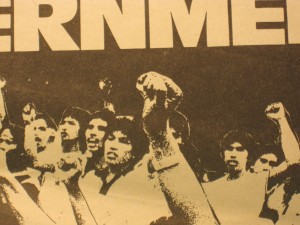Usership, Intersubjectivity, Political Meaning

Photo by Shaun Slifer, from the Interference Archive
If the people who are making vernacular, politicized cultural forms are also using these forms and doing so in groups, how do we talk about them? What about when them are us?
Users are Experts
Steven Wright*, in a 2007 lecture about people using socially-engaged art, points out that they are experts of their own experience [like drug users, or users of services as we think of in disability rights’ struggles] and suggests that the concept of usership is valuable because it takes the onus of defining the “art” or “non-art” off of the artist and puts it into the experience of someone using, a pragmatic and embodied definition.
Who owns the understanding of an experience or of an interaction? The person who had the experience, and for our purposes, that is the users. This makes me think of the movement maxim: Who knows the solutions to their problems? Those most affected.
Wright believes that intersubjectivity is more useful a concept than relationality because it focuses on users rather than expert makers [artists], and he states that “users comprise a loose-knit community based upon common experience…the bedrock of human relationality”.
Intersubjectivity
A term used across multiple disciplines, for our cultural/philosophical needs, we can define intersubjectivity as “a psychological relationship between people that acknowledges shared cognition and is essential in the shaping of our ideas and relations.” That is to say, if subjectivity is one’s singular experience of consciousness, intersubjectivity is your experiences of being part of the people around you which affects your decisions, thoughts, ideas, sense of freedom or actions.
Having a sense of deep connection as a part of others is challenged by our highly individualized society, and recent philosophers [Nancy, Agamben] talk about how being-with, being-part-of and comprehending “we,” is highly difficult, as it’s rarely supported, but is in fact what comprises us. We are not without the others we see as part of “we,” and our selves are only self in relation to others’ selves. Think about the “we” of people stuck on a bus or the “we” of people at a dance party.
Basically, You Are Not Alone is not just a slogan, it’s a core tenant of cognizance and conscious experience.
Introducing: Self-Interest and Multitudes
There are also collective and networked forms of “we” or social understanding that Wright also brings up. Political philosopher Hannah Arendt works through some of these ideas when she talks about self-interest as a site of connecting across differences and seeing the connections between diverse groups of people. For Arendt, understanding that each person has a set of interests that tend toward freedom is itself the site in which we can locate our stances as allies, supporters, and participants in the struggles of others.
Another concept is the multitude: an intersubjective and productive self-organized political collectivity based in overlapping networks and group ownership of ideas, actions, or cultural productions. Italian political philosopher Antonio Negri describes the multitude in The Savage Anomaly as “an unmediated, revolutionary, immanent, and positive collective social subject which can found a ‘nonmystified’ form of democracy (p. 194).” The multitude is made up of those who produce; the makers of a group’s intelligent and non-externally-coordinated activity. Imagine the many strands of a snake march, the surprising corners from which terms or ideas start “trending,” or the group of people amassed on a corner protesting.
So What If We Know About Other People
This difficult-to-name cross-section of people affected by and creating works that have political intention speak to theories interested in group power relationships. This collectivity of people are those who can be affected by – and more importantly, co-create by their participation in — the cultural or art work.
There is a political meaning to all these ways of self-and-group understanding. Somewhere between the individual user, maker, or person experiencing and the ways in which group creation, use and experience affect the individual is where the political exists.
Coming up: Sholette, interventionist art & tactical media, and more social spaces where resistance systems appear.
Suggested Readings:
“Users and Usership of Art: Challenging Expert Culture,” Stephen Wright, 2007. http://transform.eipcp.net/correspondence/1180961069
Multitude: War and Democracy in the Age of Empire, Michael Hardt and Antonio Negri, 2004. http://www.filesonic.com/file/1516569144/23568_1594200246.pdf
Further Readings & Theorists:
- “The Indignity of Speaking for Others: An Imaginary Interview,” Beyond Recognition: Representation, Power, and Culture. By Craig Owens.
- Michelle De Certeau
- Jean-Luc Nancy
* I arrived at Stephen Wright’s work [via Gregory Sholette’s darkmatter.net website] and for the first time began to think that someone in the Art World had not drank the kool-aid of Artists as The Man Behind The Curtain, making folks’ “have experiences” for their own specific purposes.
